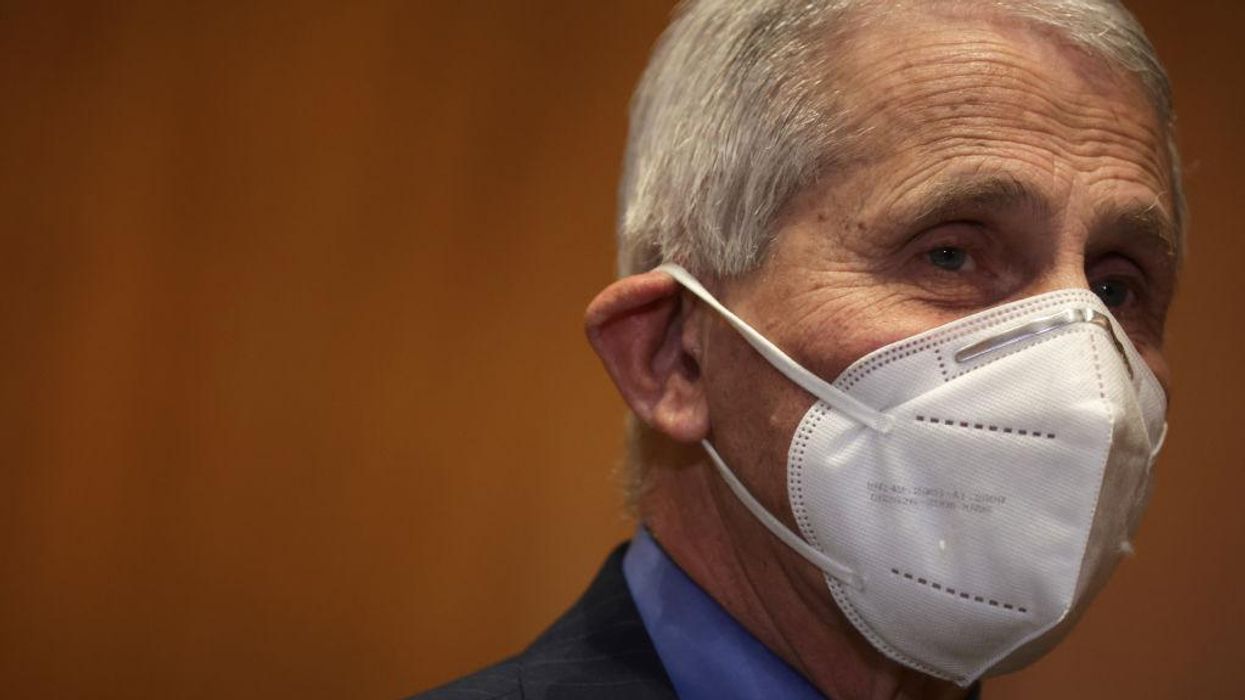
Alex Wong/Getty Images

A group of the world's top virologists held secretive private discussions in February 2020 on "all theories" of the origins of COVID-19 days after they began drafting an influential article that would attempt to debunk the lab-leak theory, newly reported emails reveal.
The group was led by Wellcome Trust Director Jeremy Farrar and University of Sydney virologist Edward Holmes. Members of these discussions included then-National Institutes of Health Director Dr. Francis Collins and the U.S. government's top pandemic spokesman, Dr. Anthony Fauci.
A Freedom of Information Act request by U.S. Right to Know reveals that their discussions on the pandemic's origins continued on Feb. 7, 2020, three days after an article purporting to show the virus "is not a laboratory construct or a purposefully manipulated virus" was drafted and a week after a previously reported conference call on Feb. 1.
“Eddie Holmes and a small group have been looking extensively at the origins and evolution of n-CoV including all theories,” Farrar wrote to National Academy of Medicine President Victor Dzau on Feb. 8, 2020, using an abbreviation for "novel coronavirus" in reference to the emerging SARS-Cov-2 virus.
“This is the latest summary, written as part of a series of [teleconference] discussions we set up and included [National Institute of Allergy and Infectious Diseases Director Anthony Fauci] and [National Institutes of Health Director Francis Collins] as well as a small group from USA, UK, Europe and Australia,” Farrar wrote.
The records obtained by U.S. Right to Know included six pages of notes from the Feb. 7 discussion, but the material is fully redacted.
\u201cHere\u2019s the email from @JeremyFarrar to @VictorDzau and @edwardcholmes with the Feb. 2020 summary of the virologists\u2019 conclave with Tony Fauci and Francis Collins on the origins of Covid-19. All six pages of the summary are redacted. https://t.co/BXTg7XAEUB\u201d— Gary Ruskin (@Gary Ruskin) 1654174531
The newly unearthed records reveal that scientists continued to consider the lab-leak origins theory of COVID-19 in private while working to dismiss the theory in public. But exactly what they discussed remains unknown, hidden behind redacted records and repeated refusals to comment.
There are two competing theories of the origins of the coronavirus pandemic. The first is that the virus has natural origins — that it was carried by an animal host and evolved to be contagious among human beings. This is the view widely accepted by most scientists.
The second theory is that researchers at the Wuhan Institute of Virology, a Chinese lab that studies coronaviruses, may have genetically manipulated one of their virus samples, creating SARS-CoV-2, and somehow that engineered virus leaked from the lab. This theory was maligned as a crackpot conspiracy theory by most public health officials.
Neither hypothesis of the pandemic's origins has been definitively proven or ruled out. An intelligence review by President Joe Biden's administration determined the theories were "equally plausible" and that the lab-leak hypothesis was "a credible line of inquiry."
In previously reported email chains, Farrar, Fauci, and other public health officials were shown to have discussed the possibility that the Wuhan coronavirus was "engineered." But after holding private conference calls on the matter, many of those involved waged a vigorous public campaign to discredit the lab-leak theory, apparently with no outstanding scientific reasons for doing so.
That public campaign began with a Feb. 19, 2020, statement signed by Farrar and other top health and medical professionals that strongly condemned "conspiracy theories suggesting that COVID-19 does not have a natural origin". It continued with various public statements from Fauci and others that the lab-leak theory was a "conspiracy," which led social media companies to censor any discussion of the possible lab origins of COVID-19.
Perhaps the most significant blow to the credibility of the lab-leak theory came on March 17, 2020, with the publication of a letter titled, "The proximal origin of SARS-CoV-2." This letter sought to definitively squash the idea that COVID-19 came from a laboratory setting. "We do not believe any type of laboratory-based scenario is plausible," the authors wrote, words that were seized by the national media and used to attack President Donald Trump because he had made statements supportive of the lab-leak theory.
Yet just one month before the "proximal origins" letter was published, three of its five authors had privately concluded that aspects of the SARS-CoV-2 virus were "inconsistent with expectations from evolutionary theory" and that "some of the features (potentially) look engineered." Their opinion was revealed in a Feb. 1 email to Fauci, first published by BuzzFeed News.
A subsequent Feb. 4 email from Farrar to Fauci and Collins revealed he was split "50-50" between the natural origins and lab-leak theories and that Holmes was "60-40" in favor of the lab origin.
Emails transcribed by Republican staff on the House Committee on Oversight and Reform show that on the same day Farrar sent a draft of the "proximal origins" paper with Fauci.
Farrar, Fauci, and the rest have stated that while they were initially open to all theories of the virus' origins, their change of opinion and embrace of the natural origins theory reflected the weight of scientific evidence.
However, there is a potential conflict of interest in how Fauci and Collins shaped the narrative that the lab-leak theory of COVID-19's origins was a "conspiracy theory." The nonprofit group EcoHealth Alliance had received federal grants from Fauci's agency to study coronaviruses and had sub-awarded nearly $600,000 to the Wuhan lab in the years preceding the pandemic.
Whether the Wuhan lab used that grant money to conduct risky gain-of-function research to create new artificially enhanced viruses is a hotly contested claim, with Fauci and others denying it and Republican lawmakers like Sen. Rand Paul (R-Ky.) accusing them of lying.
The truth is likely redacted.